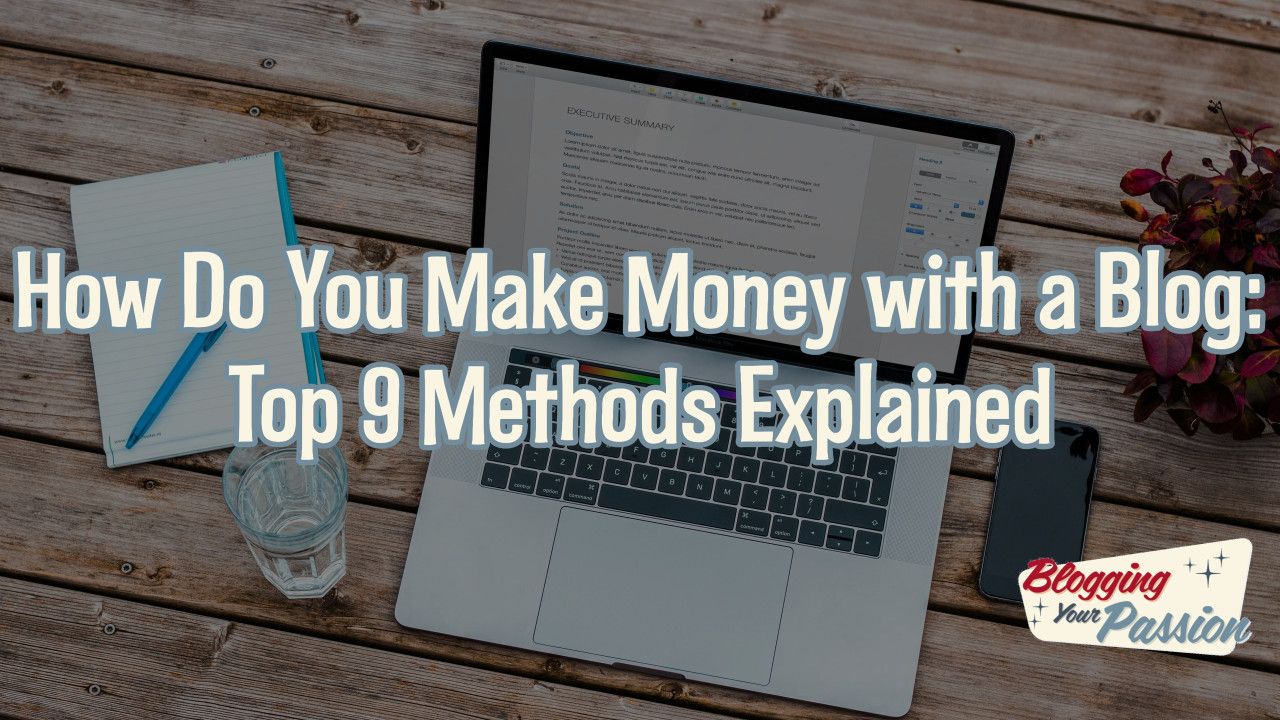Unleashing the Power of Niche Blogging: Tips and Tricks for Maximum Earnings
The Importance of Finding Your Niche
As a blogger, finding your niche is crucial in establishing your brand and growing your audience. A niche is a specific area of interest or expertise that you will focus on in your blog. It can be a hobby, a profession, a lifestyle, or anything that you are passionate about. Here are some reasons why finding your niche is important:
1. Defines Your Target Audience
When you have a specific niche, you can easily identify your target audience. You can create content that caters to their interests and needs, which will make them more likely to engage with your blog. For example, if your niche is cooking, you can create content about recipes, kitchen gadgets, and cooking tips that will appeal to food enthusiasts.
2. Establishes Your Authority
When you focus on a niche, you become an expert in that area. This helps you establish your authority and credibility in your field. Your readers will trust your opinions and recommendations, which can lead to higher engagement and conversions. For example, if your niche is fitness, you can create content about workouts, nutrition, and supplements that will help your readers achieve their fitness goals.
3. Differentiates You from Competitors
With millions of blogs out there, finding your niche can help you stand out from the competition. By focusing on a specific area, you can differentiate yourself from other bloggers who cover a wide range of topics. This can help you build a loyal following and increase your visibility in search engines. For example, if your niche is travel, you can create content about a specific location or type of travel, such as budget travel or luxury travel.
In conclusion, finding your niche is important in creating a successful blog. It helps you define your target audience, establish your authority, and differentiate yourself from competitors. So take some time to think about what you are passionate about and what you can offer to your readers. Once you find your niche, you can start creating content that will engage and inspire your audience.
Choosing Profitable Keywords for Your Blog
Choosing the right keywords for your blog is an essential part of maximizing your earnings. Keywords are the words or phrases that people use to search for information online. By incorporating relevant and profitable keywords into your blog content, you can attract more traffic to your site and increase your chances of earning money through ads and affiliate marketing. Here are some tips on how to choose profitable keywords for your blog:
1. Use Keyword Research Tools
Keyword research tools like Google Keyword Planner, SEMrush, and Ahrefs can help you identify profitable keywords for your blog. These tools provide data on search volume, competition, and cost per click, which can help you determine which keywords are worth targeting.
2. Choose Long-Tail Keywords
Long-tail keywords are longer and more specific phrases that people use when searching for information online. They are usually less competitive than short-tail keywords and can help you attract more targeted traffic to your blog. For example, instead of targeting the keyword “fitness,” you can target the long-tail keyword “best fitness tips for beginners.”
3. Focus on User Intent
User intent refers to the reason why people are searching for a particular keyword. By understanding user intent, you can create content that addresses their needs and interests. For example, if someone is searching for “best budget travel destinations,” they are probably looking for ideas on where to travel on a budget. By creating content that provides useful information on budget travel destinations, you can attract more traffic to your blog.
4. Incorporate Keywords Naturally
While it’s important to include keywords in your blog content, it’s also important to use them naturally. Keyword stuffing, or the practice of overusing keywords in an attempt to manipulate search engine rankings, can hurt your blog’s credibility and visibility. Instead, focus on creating high-quality content that incorporates keywords in a natural and meaningful way.
In conclusion, choosing profitable keywords is an important part of maximizing your earnings as a blogger. By using keyword research tools, focusing on long-tail keywords and user intent, and incorporating keywords naturally into your content, you can attract more targeted traffic to your blog and increase your chances of earning money through ads and affiliate marketing.
Utilizing SEO Strategies to Boost Traffic
Search engine optimization (SEO) is a set of techniques used to improve the visibility and ranking of your blog in search engine results pages (SERPs). By utilizing SEO strategies, you can attract more organic traffic to your blog, which can lead to higher earnings through ads and affiliate marketing. Here are some tips on how to utilize SEO strategies to boost traffic to your blog:
1. Optimize Your Blog’s Structure
Your blog’s structure plays an important role in SEO. Make sure that your blog’s design is user-friendly and easy to navigate. Use clear and descriptive URLs, include a sitemap, and make sure that your blog is mobile-friendly. A well-structured blog can help search engines crawl and index your content more efficiently.
2. Conduct Keyword Research
As discussed in the previous section, choosing the right keywords is important for SEO. Conduct keyword research to identify the keywords that your target audience is searching for, and incorporate those keywords into your blog content. Use relevant keywords in your titles, headings, meta descriptions, and throughout your blog posts.
3. Create High-Quality Content
Search engines prioritize high-quality content that provides value to users. Create content that is informative, engaging, and relevant to your niche. Use images, videos, and other media to enhance your content and keep your readers engaged. Make sure that your content is well-written and free of errors.
4. Build Backlinks
Backlinks are links from other websites to your blog. They are an important factor in SEO because they signal to search engines that your content is valuable and authoritative. Reach out to other bloggers and websites in your niche and ask if they would be willing to link to your content. You can also build backlinks by guest posting on other blogs and including a link back to your blog in your author bio.
5. Monitor Your Analytics
Monitoring your blog’s analytics can help you track your progress and identify areas for improvement. Use tools like Google Analytics to track your traffic, engagement, and conversion rates. Analyze your data regularly and make adjustments to your SEO strategies as needed.
In conclusion, utilizing SEO strategies is an important part of maximizing your earnings as a blogger. By optimizing your blog’s structure, conducting keyword research, creating high-quality content, building backlinks, and monitoring your analytics, you can attract more organic traffic to your blog and increase your chances of earning money through ads and affiliate marketing.
Monetizing Your Blog with AdSense
AdSense is a popular advertising program by Google that allows bloggers to make money by displaying ads on their websites. AdSense works by matching ads to your blog’s content and audience, so you can earn money when visitors click or view the ads. Here are some tips on how to monetize your blog with AdSense:
1. Apply for AdSense
The first step to monetizing your blog with AdSense is to apply for the program. Make sure that your blog meets Google’s eligibility requirements, which include having original and high-quality content, complying with Google’s policies, and adhering to the program’s terms and conditions. Once your application is approved, you can start displaying ads on your blog.
2. Optimize Ad Placement
The placement of your ads can have a significant impact on your earnings. Experiment with different ad formats and positions to see which ones perform best. Generally, ads placed above the fold (the portion of the page visible without scrolling) and near your content tend to perform better. However, make sure that your ads do not interfere with your user experience or violate Google’s policies.
3. Use AdSense Optimization Tools
Google provides several optimization tools that can help you maximize your AdSense earnings. These tools include the AdSense Performance Reports, which provide insights into your ad performance, and the AdSense Experiments, which allow you to test different ad formats and placements. Use these tools to identify areas for improvement and optimize your ad strategy.
4. Monitor Your Ad Performance
Monitoring your ad performance is essential for maximizing your AdSense earnings. Use the AdSense Performance Reports to track your ad impressions, clicks, and earnings. Analyze your data regularly and make adjustments to your ad strategy as needed. For example, if you notice that certain ad formats or placements are not performing well, you can try switching to different ones.
5. Complement AdSense with Affiliate Marketing
While AdSense can be a great way to monetize your blog, it’s not the only option. Consider complementing AdSense with affiliate marketing, which involves promoting other people’s products and earning a commission for each sale or lead generated. Choose affiliate products that are relevant to your niche and audience, and promote them in a way that adds value to your readers.
In conclusion, AdSense can be a powerful tool for monetizing your blog. Apply for the program, optimize your ad placement, use AdSense optimization tools, monitor your ad performance, and consider complementing AdSense with affiliate marketing. With the right
Maximizing Earnings with Affiliate Marketing
Affiliate marketing is another popular way for bloggers to monetize their content. It involves promoting other people’s products or services and earning a commission for each sale or lead generated through your unique affiliate link. Here are some tips on how to maximize your earnings with affiliate marketing:
1. Choose Relevant Products
When choosing affiliate products to promote, make sure that they are relevant to your niche and audience. Choose products that you have personally used and can vouch for, or products that you know your audience will find useful. This will increase the likelihood of your readers clicking on your affiliate links and making a purchase.
2. Be Transparent
Transparency is key in affiliate marketing. Disclose to your readers that you are using affiliate links and that you will earn a commission if they make a purchase. This will build trust with your audience and prevent any potential legal issues. You can disclose your use of affiliate links in your blog’s disclaimer or on individual blog posts.
3. Promote Products in a Natural Way
Avoid being too salesy or promotional when promoting affiliate products. Instead, incorporate them into your content in a natural and informative way. For example, if you are promoting a fitness product, you can create a blog post about the benefits of working out and include a link to the product at the end of the post.
4. Use Multiple Affiliate Programs
Don’t rely on just one affiliate program to monetize your blog. Join multiple programs that offer products or services relevant to your niche. This will give you more options to choose from and increase your chances of earning commissions.
5. Monitor Your Affiliate Performance
Monitoring your affiliate performance is essential for maximizing your earnings. Use affiliate tracking tools like Google Analytics or the affiliate program’s dashboard to track your clicks, conversions, and earnings. Analyze your data regularly and make adjustments to your affiliate strategy as needed. For example, if you notice that certain products are not performing well, you can try promoting different ones.
In conclusion, affiliate marketing can be a lucrative way to monetize your blog. Choose relevant products, be transparent, promote products in a natural way, use multiple affiliate programs, and monitor your affiliate performance. By following these tips, you can increase your chances of earning commissions and maximizing your blog’s earnings.
Leveraging Social Media for Blog Promotion
Social media is a powerful tool for promoting your blog and reaching a wider audience. By leveraging social media platforms like Facebook, Twitter, Instagram, and LinkedIn, you can increase your blog’s visibility, attract more traffic, and ultimately maximize your earnings. Here are some tips on how to leverage social media for blog promotion:
1. Choose the Right Platforms
Not all social media platforms are created equal. Choose the platforms that are most relevant to your niche and target audience. For example, if your niche is fashion, Instagram and Pinterest might be more effective than Twitter or LinkedIn. Research your audience’s demographics and preferences to identify the platforms that are most likely to reach them.
2. Optimize Your Profiles
Make sure that your social media profiles are optimized for your blog. Use a consistent profile picture and cover photo across all platforms, and write a bio that clearly describes your niche and what readers can expect from your blog. Include a link to your blog in your profile and use relevant keywords to help users find your content.
3. Share Your Blog Content
Share your blog content regularly on social media. Use eye-catching visuals, attention-grabbing headlines, and relevant hashtags to increase your posts’ visibility. Be sure to include a call-to-action that prompts readers to click through to your blog. You can also repurpose your blog content into different formats, such as videos or infographics, to reach a wider audience.
4. Engage with Your Followers
Engage with your followers on social media by responding to comments, asking for feedback, and sharing user-generated content. This will help you build a community around your blog and increase your followers’ loyalty. You can also use social media to conduct polls, surveys, or contests to encourage user engagement.
5. Collaborate with Other Bloggers
Collaborating with other bloggers on social media can help you reach new audiences and build relationships with other influencers in your niche. You can guest post on each other’s blogs, share each other’s content, or collaborate on a social media campaign. This will help you expand your reach and establish yourself as an authority in your field.
In conclusion, leveraging social media is an essential part of promoting your blog and maximizing your earnings. Choose the right platforms, optimize your profiles, share your blog content, engage with your followers, and collaborate with other bloggers. By following these tips, you can effectively use social media to grow your blog and increase your earnings.














 Over 10 years of experience in managing all size of tech projects.
Over 10 years of experience in managing all size of tech projects.